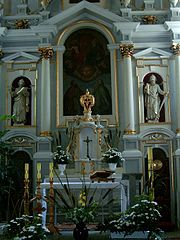
A History Of The Mass And Its Ceremonies In The Eastern And Western Church -Rev John O'Brien A.M.
MANNER OF READING THE CANON
Out of the great respect that is due to this most solemn portion of the Mass, as well as to secure the utmost recollection on the part of the priest and people, it has been customary from time immemorial to recite it throughout in secret. Another reason, too, that is often given for-this laudable practice is that the sacred words may be kept from becoming too common—a thing which could hardly be avoided if they were read in a tone audible to all; for, inasmuch as the Canon seldom changes, the same words would be heard upon every occasion, and in process of time thoughtless persons would have committed them to memory, and perhaps might use them in common parlance, to the great disedification of our holy religion. (For a very low misapplication of the sacred words of institution, which originally took rise in the way we are speaking of, the reader is referred to Disraeli’s Amenities of Literature.)
A very singular story touching the silence observed in reciting the Canon is related in the Spiritual Meadow, a book written about the year 630 by a holy recluse named John Moschus. The book received the encomiums of the Fathers of the seventh General Council, held at Nicæa in 787, and it therefore carries some authority with it. It is therein stated that a party of boys guarding flocks in Apamea, in Syria, took it into their heads one day to while away a portion of their time by going through the ceremonies of Mass. One acted as celebrant, another as deacon, and a third as subdeacon. All went along pleasantly, as the story relates, until he who personated the celebrant pronounced the sacred words of consecration, when suddenly a ball of fire, rapid and fierce as a meteor, fell down from heaven, and so stunned the boys that they fell prostrate on the ground. When this singular occurrence was afterwards related to the bishop of the place, he went to examine the spot, and, having learned all the particulars of the case, caused a church to be built thereon to commemorate so remarkable an event. From this circumstance, it is said, the Church derives her custom of reciting the Canon in secret. Be this as it may, the ablest liturgical writers maintain that the Canon has been recited in secret from its very institution (Romsee, iv. p. 175).
As a precedent for this solemn silence many examples may be adduced from Holy Writ. On the great day of Atonement, for instance, while the high-priest was offering incense to Jehovah on the golden altar, a deep silence prevailed throughout the entire temple, and all the people recited their prayers in secret. To this solemn silence St. John evidently alludes when he says that at the opening of the seventh seal “there was silence in heaven, as it were for half an hour” (Apoc. 8:1). Mention is also made of it in the Mishna in describing the “drink offering”: “Then came the time of the drink offering, when, having given him the wine of which it consisted, the Sagan, who stood beside the horn of the altar, observed the time for pouring it out, and with a napkin gave the signal for the music to begin. The reason of their being so long was that the perfect sacrifice might be before God, and that silence best suited so solemn a duty” (Bannister, Temples of the Hebrews, pp. 211, 329; see also Habacuc, 2:20).
Copyright ©1999-2023 Wildfire Fellowship, Inc all rights reserved

 Keep Site Running
Keep Site Running